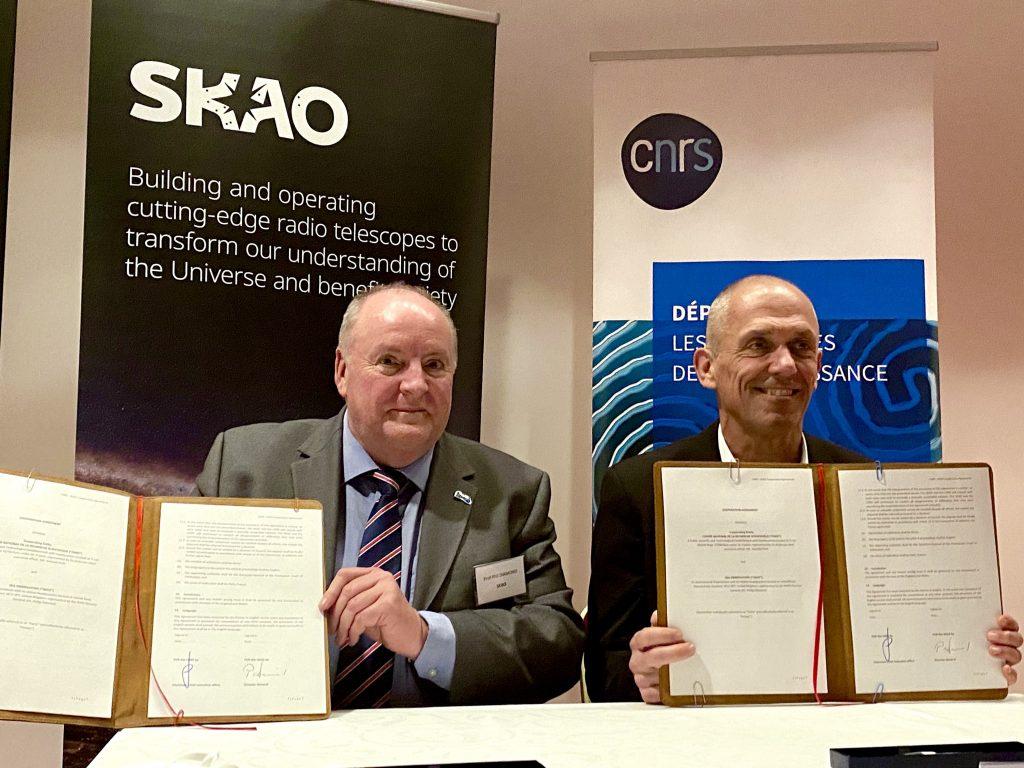SKAO signs agreement with French national research agency CNRS

In May 2021, the SKAO’s governing Council decided unanimously to admit France as a member. President Emmanuel Macron then confirmed the country’s intention to ratify the SKA Convention on a state visit to South Africa in May 2021. While the processes to complete the accession of France to the SKAO are completed during 2022 and 2023, the agreement with CNRS is an interim step that allows the French scientific and industrial communities to continue their engagement with the SKAO and for scientists to reap the benefits of the SKA.
“French involvement in the SKAO has been long in the making,” said the Director-General of the SKAO, Prof. Philip Diamond, at the ceremony. “This agreement allows France to formally participate in the activities of the Observatory. It will also enable France to make its first financial contributions and, in turn, will allow French industry to be awarded construction contracts in the coming months. It will further elevate our relationship with the French government in anticipation of full membership. We welcome our colleagues in this historic undertaking of commencing the construction of the world’s largest radio telescope as an international effort.”
Prof. Diamond was joined by Prof. Antoine Petit, President and CEO of the CNRS, in signing the cooperation agreement.
Prof. Petit commented: “I am delighted that this cooperation agreement between the CNRS and the SKAO observatory is being signed. It is a milestone towards France’s official integration as a member of SKAO in its own right. The involvement of our institution and its partners in this 21st century very-large-scale radio observatory will make it possible to meet a number of challenges – whether digital, technological, or in the field of astronomy – as part of a worldwide partnership. Australia’s kind hospitality tonight for the signature of our agreement, on the occasion of the launch of the “Australia now” campaign in France, in the presence of representatives and friends from across the world, illustrates this partnership beautifully.”
France has a 70-year history of radio astronomy, and its Nançay Radio-astronomy Station is home to antennas of two SKA pathfinder facilities: an international LOFAR station as well as NenuFAR (New Extension in Nançay Upgrading LOFAR).
During the SKA’s pre-construction phase, French engineers and scientists took part in five of the 11 international engineering consortia that designed the SKAO telescopes. Their work included contributions to the SKA dishes, low-frequency antennas, receivers, and signal processing.
French scientists also fruitfully participated in SKA preparatory science meetings, and have been involved in each of the SKAO Science Working Groups, with the Cradle of Life and Extragalactic Spectral Line groups co-chaired by academics from the Paris Observatory. A white paper highlighting France’s research interests in the SKA was published in 2017, involving 178 authors from 40 institutes and six private companies.
In 2018, France officially became involved in the SKA through the Maison SKA-France. This consortium brings together seven public research organisations (CNRS, Paris Observatory, Côte d’Azur Observatory, University of Orléans, University of Bordeaux, National Institute for Research in Digital Science and Technology, and CEA’s Fundamental Research Division) and seven private companies (Air Liquide, ATOS-Bull, Callisto, CNIM, FEDD, Kalray, and Thales). Headed up by the CNRS, the resulting public-private collaboration helped position the SKA project within France’s industrial, scientific, and political spheres, leading to the SKA being placed on the country’s national research infrastructure roadmap.
The SKAO has also recently signed similar cooperation agreements with research institutions in Switzerland, Sweden, Canada, and India.




